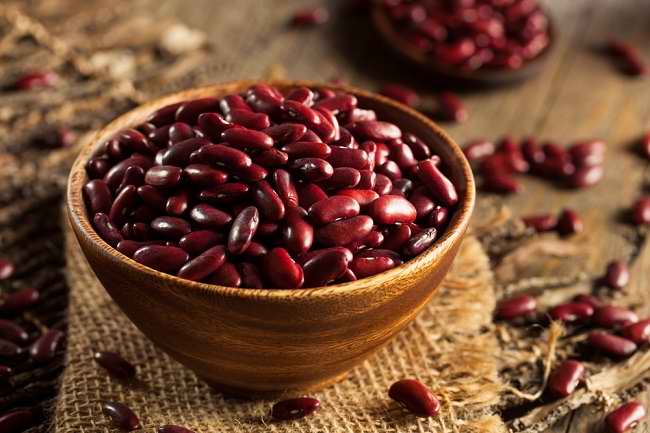LifeSurance.info – Pregnant women’s nutritional intake can be obtained from various food choices. One of them is red beans. The benefits of red beans for pregnant women are numerous, from preventing constipation to preventing anemia. Check out this article to learn the benefits of red beans for pregnant women.
During pregnancy, it is important for pregnant women always to meet their nutritional needs. This is done so that the growth and development of the fetus in the womb is maintained, as well as preventing the mother and fetus from various risks of health problems.
Pregnant women can consume various food choices to meet their nutritional needs during pregnancy, such as red meat, eggs, fish, milk and processed products, fruit and vegetables, and nuts, including red beans.
Various nutritional contents in red beans
Red beans (Phaseolus vulgaris) are often called kidney beans because their shape resembles a kidney. In Indonesian cuisine, red beans are often used as a mixture of several dishes, such as soup and rendang, as well as soft drinks, such as red bean ice.
A serving of cooked red beans, or around 100 grams, contains 100–130 calories and various nutrients, such as:
- 7–8.5 grams of protein
- 20–25 grams of carbohydrates
- 5.5–7 grams of fiber
- 0.5–1 gram of fat
- 80–90 milligrams (mg) calcium
- 6–7 milligrams of iron
- 300–1,400 milligrams of potassium
- 4.5–5 milligrams of vitamin C
- About 400 micrograms (mcg) of folate
Apart from the various nutrients above, red beans also contain vitamin B, vitamin K, choline, phosphorus, manganese, zinc, and magnesium. Because its nutritional content is quite high, it is not surprising that there are many benefits of red beans for pregnant women.
Various Benefits of Red Beans for Pregnant Women
The following are various benefits of red beans that pregnant women can get:
1. Supports fetal nerve and brain development
Red beans are a food that contains lots of folate. Folate, also known as vitamin B9, plays an important role in supporting the formation and development of fetal nerves and brain. Folate is also important for preventing congenital defects in the fetus’ nerves and brain, such as spina bifida. Apart from containing folate, red beans also contain choline which plays an important role in supporting fetal brain development.
When pregnant or planning to become pregnant, a woman needs to meet her daily folate needs of 400–600 mcg, especially in the first trimester of pregnancy.
This intake can be met by consuming foods that contain lots of folate, such as red beans, fruit, vegetables, eggs, and fish, as well as pregnancy supplements.
2. Prevent anemia
Iron, folate, and vitamin B12 are important nutrients that play a role in the production of red blood cells. During pregnancy, a pregnant woman’s body will produce more blood to support the fetus’s nutritional needs and support the growth and development of various organs in her body.
Therefore, pregnant women need to increase their intake of iron, folate, and vitamin B12 so that the number of red blood cells produced is sufficient. Deficiency of iron, folate, and vitamin B12 can cause the production of red blood cells in the body to decrease. As a result, the body becomes deficient in blood and is at risk of developing anemia.
The condition of anemia or lack of blood during pregnancy can increase the risk of premature birth, fetal defects, low birth weight babies, and postpartum bleeding. To have an adequate number of red blood cells, pregnant women need to get 28–30 mg of iron every day. Iron intake can be obtained from red beans, meat, fish, eggs, or iron supplements prescribed by your doctor.
3. Prevent and relieve constipation
The high fiber content in red beans is known to prevent and reduce the symptoms of constipation that are often experienced by pregnant women. Not only red beans, pregnant women can also consume other fibrous foods, such as fruit and vegetables to reduce constipation.
4. Supports the growth of fetal tissues and organs
Red beans contain lots of protein, calcium, and complex carbohydrates. These nutrients play an important role in the formation of fetal tissues and organs. Calcium in red beans also plays an important role in forming the fetus’s bone tissue and teeth, as well as ensuring that pregnant women’s bones remain healthy and strong.
5. Overcoming fatigue and muscle cramps
During pregnancy, pregnant women may feel tired quickly and often have cramps. To overcome these complaints, pregnant women can consume red beans because this food contains a lot of magnesium. Magnesium is a mineral that can help muscles relax, thereby reducing complaints of cramps.
Apart from that, the high carbohydrate and potassium content in red beans can also give pregnant women more energy so they don’t get tired easily.
6. Keep blood pressure stable
One of the benefits of red beans is keeping blood pressure stable. This is thanks to the fairly high potassium content in red beans.
Potassium is a mineral that plays a role in regulating blood pressure so that it remains normal as well as regulating the rhythm of the heartbeat. Potassium deficiency during pregnancy is known to be one of the causes of pregnant women feeling tired quickly, weak, or even experiencing heart rhythm problems.
When you want to eat red beans, make sure pregnant women have washed the red beans thoroughly and cooked them until fully cooked. This is because raw red beans contain a toxic substance called phytohemagglutinin. This poison can cause food poisoning.
To meet nutritional needs during pregnancy, pregnant women are also advised to consume various types of food. The more variety of food consumed, the more types of nutrition pregnant women can get.
To ensure that the condition of the pregnant woman and her fetus remains healthy, and to know whether the nutrition that the pregnant woman is getting is adequate, pregnant women need to regularly undergo pregnancy consultations with an obstetrician.



